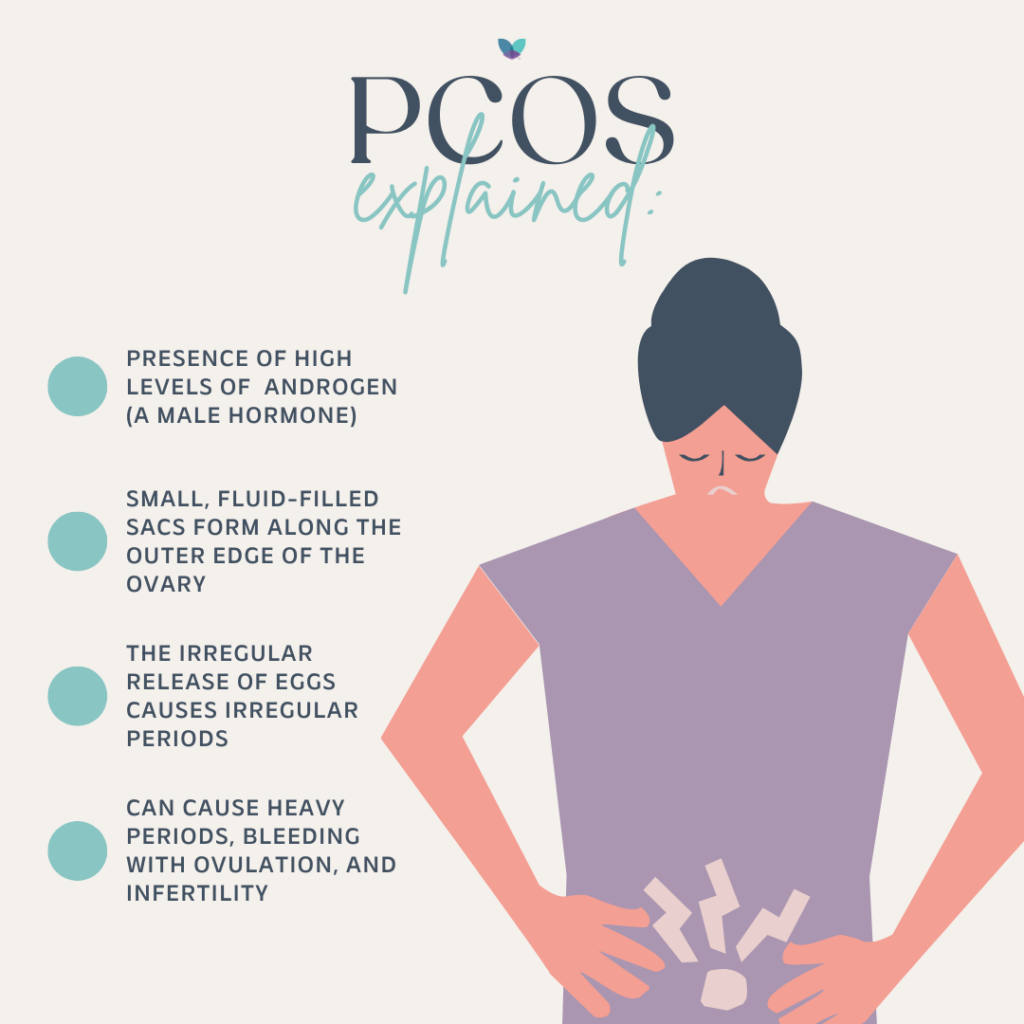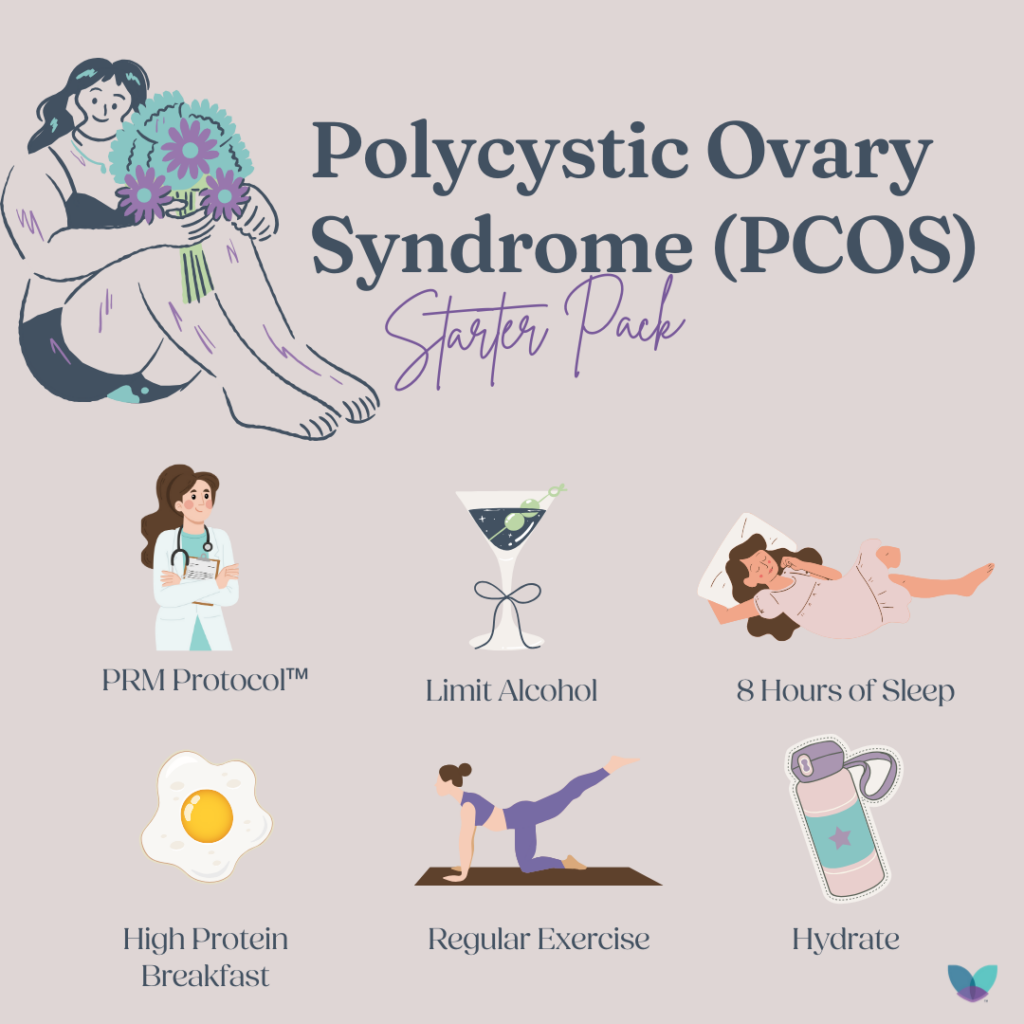What is PCOS?
Polycystic Ovary Syndrome (PCOS) is a common hormonal disorder affecting up to 10% of women of reproductive age. It is a complex condition characterized by a range of symptoms, including:
- irregular menstrual cycles
- excessive hair growth
- acne
- weight gain
- fertility issues

PCOS occurs when the ovaries produce an excess of androgens, male hormones that are usually present in people in small amounts. This hormonal imbalance can prevent the ovaries from releasing eggs regularly, leading to the formation of cysts.
Key Symptoms of PCOS
PCOS presents a variety of symptoms that can vary in severity from one person to another
The most common symptoms include:
- Irregular Periods: This is one of the hallmark symptoms of PCOS. Those with PCOS often experience infrequent, irregular, or prolonged menstrual cycles.
- Excessive Hair Growth (Hirsutism): Increased levels of androgens can lead to hair growth on the face, chest, and back.
- Acne and Oily Skin: Hormonal imbalances can cause the skin to become oily, leading to acne.
- Weight Gain: Many people with PCOS struggle with weight gain, particularly around the abdomen, and find it challenging to lose weight.
- Thinning Hair: Hair loss on the scalp is another symptom due to increased androgen levels.
- Infertility: PCOS is one of the leading causes of infertility in people because of its impact on ovulation.
How PCOS Is Diagnosed
Diagnosing PCOS typically involves a combination of medical history, a physical exam, blood tests to check hormone levels, and pelvic ultrasound to look for cysts on the ovaries. It is essential to rule out other possible conditions with similar symptoms, such as endometriosis, which can also cause pelvic pain and irregular menstrual cycles.
Meet With A Pelvic Pain Specialist
Effective Treatments for PCOS
While there is no cure for PCOS, several treatment options are available to manage its symptoms and reduce the risk of long-term complications like type 2 diabetes and heart disease. Treatment plans for PCOS are highly individualized and can include a combination of lifestyle changes, medications, and, in some cases, surgical options.
1. Lifestyle Changes:
– Diet and Exercise: A healthy diet and regular exercise can help manage symptoms like weight gain and insulin resistance, which are commonly associated with PCOS. A diet low in refined carbohydrates and high in fiber can help regulate blood sugar levels. Regular physical activity helps in maintaining a healthy weight and reduces the risk of cardiovascular diseases.

2. Medications:
– Hormonal Birth Control: Birth control pills, patches, or vaginal rings can help regulate menstrual cycles, reduce androgen levels, and clear up acne.
– Metformin: Commonly used to manage type 2 diabetes, Metformin can help with weight loss, lower insulin levels, and restore regular menstrual cycles in those with PCOS.
– Anti-Androgen Medications: These medications, such as spironolactone, can reduce excessive hair growth and acne by blocking the effects of androgens.
– Fertility Treatments: For those looking to conceive, fertility treatments like Clomid (clomiphene citrate) can stimulate ovulation.
3. Alternative Treatments:
– the PRM Protocol™ is Pelvic Rehabilitation Medicine’s proprietary, patented, simple, office-based procedure to treat the symptoms of chronic abdominal pelvic pain by a direct treatment of inflamed pelvic nerves and spastic pelvic muscles which are often the root cause of symptoms. PCOS can be related to other pain and symptoms in the pelvic floor, which our treatment can address.
4. Surgical Options:
– Ovarian Drilling: In rare cases where medications do not work, a minimally invasive surgery called ovarian drilling may be recommended. This procedure involves making tiny holes in the ovaries with a laser or thin heated needle to restore normal ovulation.
Managing PCOS for Long-Term Health
Living with PCOS can be challenging, but with the right approach and support, it is possible to manage the symptoms effectively. A multidisciplinary approach that includes healthcare providers, nutritionists, and fitness experts can be highly beneficial.
Early diagnosis and intervention are crucial to preventing long-term complications and improving the quality of life for those affected by PCOS.
